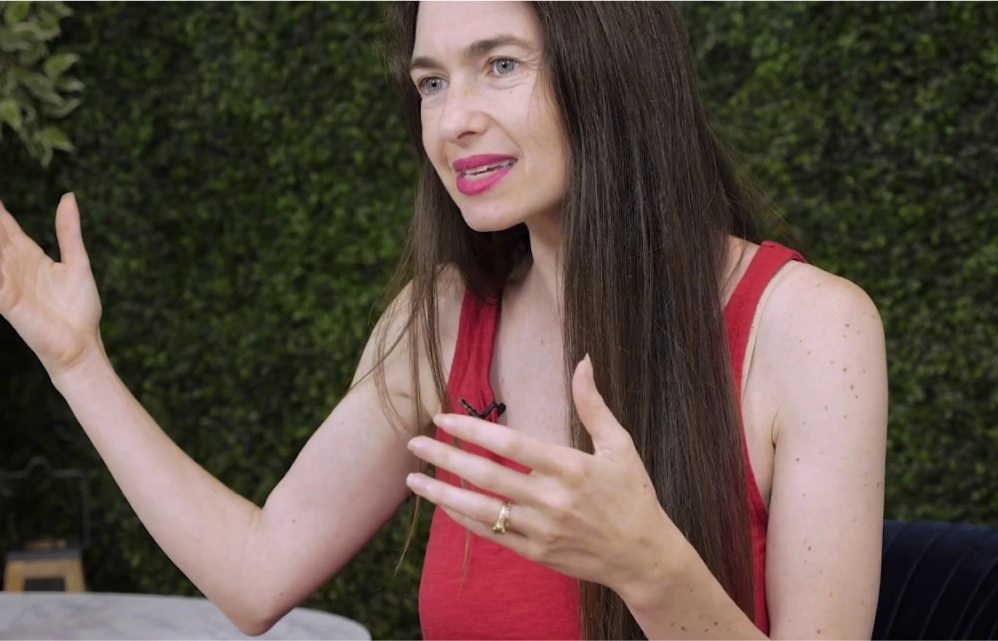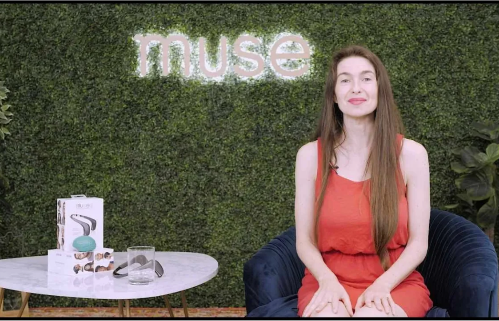
Guided Meditation 101
Guided Meditation 101
When you are just starting your meditation practice, it can be overwhelming to know exactly where to start. This article provides an in-depth overview of guided and unguided meditations, including descriptions of common meditation techniques, an overview of meditation apps on the market, the mental and physical benefits of meditation, and some insight into what happens in your brain during meditation.
Both beginner and more experienced meditators can benefit from setting meditation goals, exploring different types of guided meditation techniques, and having a better understanding of how meditation can positively affect your brain and overall well-being.
WHAT IS GUIDED MEDITATION
What Is Guided Meditation?
Guided meditations are led by an experienced meditation teacher, either in person, over a live broadcast, or via pre-recorded audio or video. While guided meditations can be utilized by both new and experienced meditators, those new to the meditation practice may find the extra guidance provided by an instructor especially helpful.
It is important to note the difference between meditation and mindfulness. Meditation is a practice (action) that leads to increased mindfulness (result). The more consistent your meditation practice, the more mindful you can become in every aspect of your life, from home to work to relationships.
All guided meditations typically introduce listeners to a meditation technique as well as provide information or instruction on:
- How to begin to settle your mind and body for the meditation
- How to position your body during the meditation
- How the mind and our thoughts work
- How to better relate to and understand your thoughts and emotions
- How to incorporate meditation techniques into your everyday life
There are many different types of guided meditations to choose from and your preferences may vary depending on your emotions, the time of day, and your meditation goals.
GUIDED MEDITATION TECHNIQUES
If you are a beginner, you may want to explore multiple different teachers to find the voice, tone, and meditation style that best fits your personal needs and goals. You may also want to explore each of these guided meditation techniques in order to determine which ones work best for you:
- Loving-kindness meditations: Also sometimes referred to as metta meditations, these guided meditations help you develop loving emotions towards and send warm wishes to your family, friends, community, strangers, and even those individuals with whom you have a difficult relationship. These meditations may also help you visualize receiving love from family, friends, and others.
- Gratitude meditations: These guided meditations can help you reflect on all of the positive things in your life, such as your loved ones, your morning cup of coffee, or even your pet. This practice can help increase your positive emotions, improve your well being, and reduce stress levels.
- Mantra meditations: Mantra-based guided meditations encourage you to repeat a word, phrase, sentence or positive affirmation either out loud or to yourself in order to help you find your focus, develop more calm, and increase positive emotions.
- Open awareness meditations: Also known as open attention meditations, this technique encourages you to observe your thoughts, sensations, and emotions without judgment, allowing them to pass through you while recognizing that they do not define you. Open awareness meditations allow you to develop a broader view.
- Zen meditations: Traditionally performed seated in a lotus or half-lotus position, these meditations are based on Zen Buddhist tradition and encourage you to focus your attention on your breath in order to stay in the present moment.
- Visualization meditations: This active meditation technique encourages you to imagine calming scenes, best-case scenarios, or replay past positive events. Visualizations can be used to help you prepare for high-performance opportunities, such as athletic events, presentations, and negotiations.
- Emotional release meditations: These guided meditations help you let go of negative emotions by locating in your body and releasing the tension associated with them. This technique can help improve your emotional well being and mood.
- Body scan meditations: This meditation technique encourages you to move your attention from one part of your body to another, sequentially relaxing your muscles as the meditation progresses.
- Progressive muscle relaxation: These guided meditations encourage you to tense and release your muscles in order to achieve a higher level of relaxation throughout your body.
- Breath awareness meditations: This guided meditation technique encourages you to keep your focus on your breath throughout your meditation session.
- Walking meditations: These guided meditations were designed to help you become more mindful and aware of the present moment, whether you’re walking in the city or in the woods. This technique is the perfect way to sync your mind and body.
- Focused attention meditations: These guided meditations encourage you to direct your attention to a single object, such as your breath, a sound, sensation, or a part of your body. When your thoughts wander, you are encouraged to return to your point of focus. This meditation technique can help increase your ability to concentrate.
Incorporating different techniques into your practice may help keep your daily meditation routine more challenging and interesting. As your meditation skills increase, your meditation preferences may change as well. You may want to occasionally check in on the effectiveness of your practice by reflecting on questions such as:
- What type of changes have I noticed in myself, if any, since starting my meditation practice
- What are my current meditation goals?
- How effective has my practice been in helping me reach those goals?
- How can I measure my daily progress towards these goals?

- If my practice is not helping me reach my goals, what should I change about my practice in order to improve?
- Is my meditation practice currently challenging me or have I reached a plateau?
- Am I connecting with fellow meditators to answer questions that come up for me?
Revisit these questions every few months to determine if your meditation practice is working for you. It is best to approach your practice with an open and flexible mind in order to ensure continued growth.
For more insight on mindfulness and meditation, be sure to listen to this Untangle podcast with instructor Michael Apollo.

Where to Experience Meditation
You can experience meditation in a variety of ways. An important part of the practice is finding the right type that works for you! Here are some methods to cultivate a meditation practice:
- Guided Meditation Apps
- In-Person Meditation Classes
- Online Meditation Classes and Workshops
- Unguided Meditation
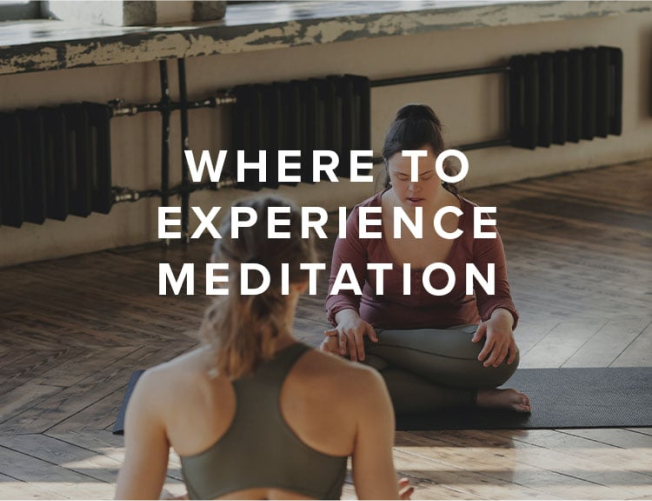
Guided Meditation Apps
If you are just starting your meditation practice or want to expand your current practice, guided meditations can introduce you to experienced teachers that can enhance your meditation experience.
There are numerous guided meditation apps on the market, but it can be hard to know which tool is right for you. Here is a quick overview of a few of the top meditation apps:
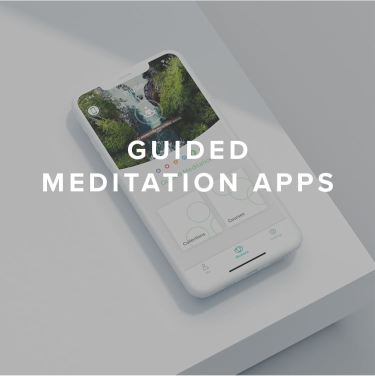
Muse app: Includes free guided meditations, including courses, pep talks, and mindset talks as well as relaxing soundscapes and real-time biofeedback when paired the Muse brain-sensing headband.
Headspace: Includes guided meditations and basic meditation techniques for beginners.
Calm: Includes meditations as well as ambient sounds and bedtime stories.
Insight Timer: Includes guided meditations, music and talks for relaxation and sleep.
Simple Habit: Includes five-minute meditations for users too busy for longer sessions.
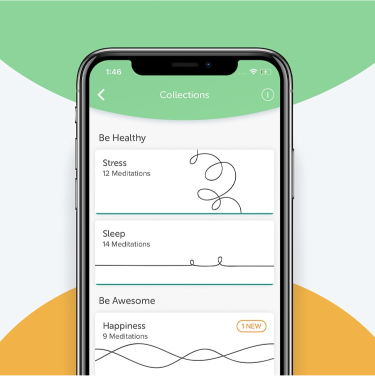
The guided meditations and courses in the Muse app cover a wide range of topics to ensure that you have the guidance you need to meet your personal and professional goals. The Muse app also includes monthly challenges, meditation streaks, progressive meditation minute goals, and milestones to help beginner and experienced meditators stay motivated and build a more consistent and rewarding practice.
To access additional free guided meditations and monthly challenges on the Muse app, sign up for our newsletter.
For a more thorough overview of the costs and benefits of various meditation apps, be sure to read What’s the Best Meditation App for You?
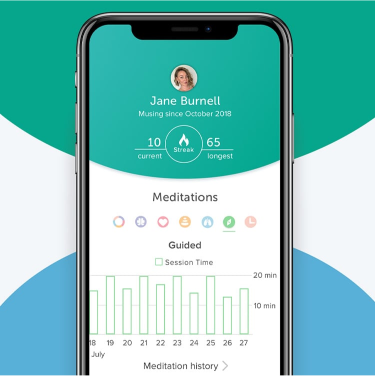
Muse’s guided meditation collection and courses are also available on Amazon Alexa, providing users with a screen-free meditation experience accessible via simple voice commands. Skill users can ask for meditation by collection, meditation title, or topic. The skill includes 14 free guided meditations.
Muse guided meditation subscribers can connect their Muse account through the Amazon Alexa app to access Muse's entire collection of more than 300 guided meditations, including a weekly featured meditation. All meditations completed on Amazon Alexa count toward your streak count in the Muse app.
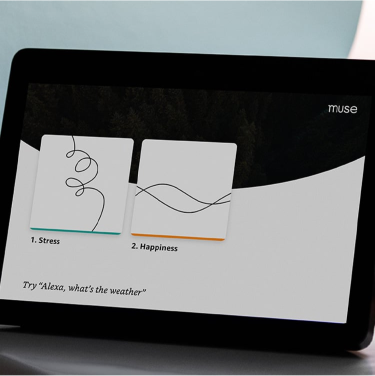
In-Person Meditation Classes
Local meditation classes are a great way to develop a more rewarding practice and can be used in conjunction with a meditation app. There are multiple benefits to in-person meditation classes, including:
- Meet like-minded individuals and become part of a meditation community: In-person classes can help you develop personal connections with other meditators and tap into the collective energy of the group.
- Develop a more consistent practice: Just like having a gym buddy can help you burn more calories, meeting a friend at an in-person meditation class can help keep you accountable and help you build a more consistent practice.
- Work through meditation blocks: If your meditation practice hits a plateau, your teacher and more experienced meditators can provide you with personalized advice that can move your practice to the next level.
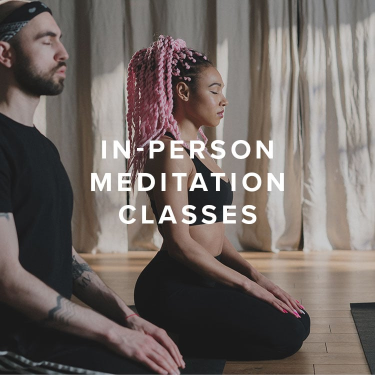
Similar to meditation classes, in-person meditation retreats, and workshops can help expose you to new meditation techniques and introduce you to new teachers, mentors, and students.
By removing distractions and getting you out of your day-to-day routine, meditation retreats can also accelerate and invigorate your practice, whether you’re a beginner and a more experienced meditator. You can search online for local meditation centers that provide in-person classes like MNDFL or more immersive meditation experiences like The Big Quiet.
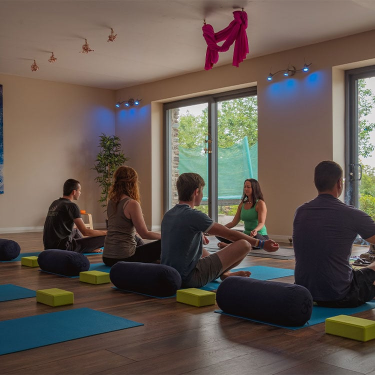
Online Meditation Classes & Workshops
Online meditation courses and workshops are an affordable alternative to in-person classes and retreats and can help you improve your practice at your own pace and in the comfort of your own home.
Online meditation classes can also give you an increased level of access to your favorite online instructors and, depending on the class, you may also have access to the course materials after the class has ended.
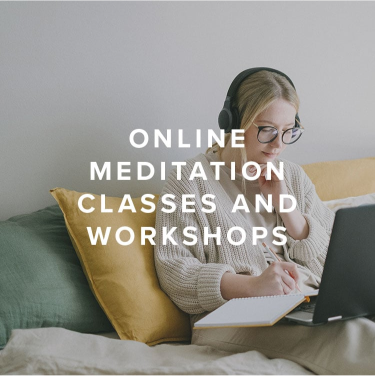
In addition, through community forums and chats, you can tap into an online community of students from all over the world, helping you feel more supported and connected throughout your meditation journey. Check out Muses's community to share your meditation results and insights!
With a guided meditation subscription, Muse users have access to a wide variety of guided meditation courses specifically designed for beginner and experienced meditators, including sessions on Meditation Essentials, Neuroscience and Wellbeing, Mindful Work, Uncovering Happiness, and more.
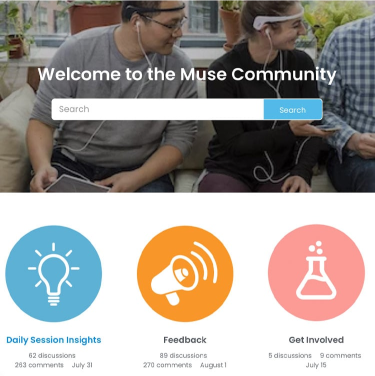
Muse meditation courses include step-by-step, in-depth instructions and can be completed at your own pace.
Each course was developed by one of our expert mindfulness and meditation instructors and include instruction, meditations, and even journaling prompts to ensure you get the most out of your meditation course. As long as you have a Muse guided meditation subscription, you can access or revisit the course materials at any time.
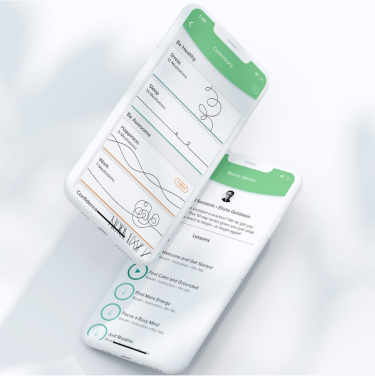
Unguided Meditation
Unguided meditations are a form of self-directed meditation that is conducted in silence or with ambient background noise or meditation music playing in the background. These meditations do not include guidance from teachers or instructors but can include bells or chimes to signal time intervals or the end of the session.
During an unguided meditation, you can decide how long you want to meditate, which meditation technique to use, and how to direct your practice. Unguided meditation gives you the freedom to meditate anytime, anywhere without the need for a device or internet access.
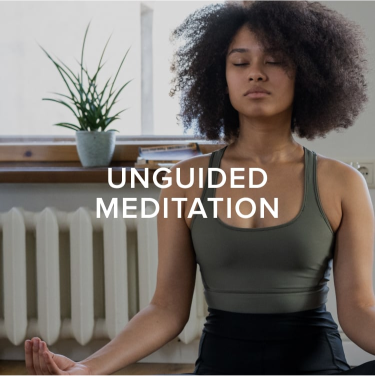
Many apps with unguided meditation timers allow you to choose an ending sound and whether to meditate in silence, with meditation music, or with relaxing nature sounds, such as birds, ocean waves, or a babbling brook.
Unguided meditations are suitable for both beginners and experienced meditators but may be most appropriate for meditators who are able to recognize when their minds’ wander and redirect their attention. Some practitioners may prefer unguided meditations because they are easily distracted by voice guidance. If you do choose to go the unguided route, make sure to keep track of your progress through journaling. This can help bring insight into our practice.

THE BENEFITS OF GUIDED & UNGUIDED MEDITATION
The Benefits of Guided and Unguided Meditation
Whether you choose to practice guided or unguided meditations, a consistent meditation practice combined with a healthy lifestyle can provide you a wide range of physical and emotional benefits, each of which are backed by scientific studies.
- Decreased stress: A study published in Psychology, Health & Medicine showed that a consistent meditation practice can help practitioners change their response to stress, recover from stressful situations more easily, and experience less stress in their everyday lives.
- Increased happiness: A study published in the Journal of Personality and Social Psychology showed that individuals who completed a mind-training practice experienced an increase in positive emotions and their overall well being. (3)
- Better sleep: A study conducted by Keck Medicine of USC found that a mindfulness meditation program improved sleep and reduced sleep problems more than the effects of a sleep hygiene education program. (4)
- Improved memory and attention: Researchers at the University of California at Santa Barbara found that graduate students who meditated for two weeks experienced improved working memory and focus. (5) A study published in Frontiers of Human Neuroscience shows that even a brief meditation session positively impacts attention in novice practitioners. (6)
- Improved test scores: In the same University of California study mentioned above, researchers found that students who meditated for two weeks improved their average verbal test scores on the GRE, a college aptitude test. (5)
- An increase in overall well being: A study published in Frontiers of Human Neuroscience concluded that Integrative Body-Mind Training can improve well-being by creating positive changes in emotion, cognition, and behaviour. (7)
- Positive changes in your brain: After an eight-week mindfulness-based stress reduction program, participants showed positive changes in the areas of the brain associated with attention regulation, self-referential processing, and perspective-taking. These changes are similar to the brain changes experienced by long-term meditators who followed a traditional meditation practice. (8)
- Performance: Professional athletes, business leaders and artists turn to meditation for that extra edge. Head coach of the Chicago Bulls, Phil Jackson brought in stress expert George Mumford, Mindfulness and Performance Expert to help the team deal with the pressures of success. Furthermore, a study conducted by The University of Toronto found that participants who meditated for up to seven minutes with Muse showed significant putting performance improvements.
- Reduced inflammation: A study published in Brain, Behavior, and Immunity showed that participants who completed an eight-week meditation training showed a smaller inflammatory response on their skin as compared to those who did not complete meditation training. (9)
- Reduced cravings: A study published in the Journal of Behavioral Medicine showed that overweight participants who meditated for ten minutes a day for one month reduced their craving-related eating by 40 percent. (10)
- Increased kindness and empathy: Participants who completed an eight-week meditation course showed an increased tendency to “adopt the perspective of others, promote non-judgmental kindness towards oneself, view suffering as a common shared experience, and foster relations to emotions with mindful attention rather than over-identifying with them,” according to the article Promoting Altruism Through Meditation: An 8-Week Randomized Controlled Pilot Study. (11)
- Decreases implicit or unconscious bias: Participants who completed loving-kindness meditations showed a decrease in the implicit or unconscious bias that is responsible for perpetuating harmful stereotypes, according to the study Combating Implicit Bias With Meditation. (12)
- A consistent practice is key to experiencing all of the benefits that meditation has to offer. Be sure to build meditation into your daily routine to help make it a healthy habit.
- For more information about how meditation changes your brain, listen to this Untangle interview with neuroscientist Sara Lazar or this one with Muse Co-founder Ariel Garten.
GUIDED MEDITATION WITH MUSE
Muse’s collection of guided meditations, pep talks, and Muse Mindset Talks were designed to help beginner and experienced meditators improve their relationships at home and work, increase positive emotions, decrease negative emotions, and improve sleep.
Our guided meditations include a wide variety of meditation techniques, including sessions focused on breath, visualization, inspiration, heart, body, mantra, and zen. To help you stay focused on your meditation goals, each guided meditation is organized into collections and courses.

Guided meditation collections include a wide variety of meditations organized by one of the following:
Theme: Stress, Sleep, Calm, Resilience, Attitudes of Mindfulness, Cancer Comfort, Happiness, Joy, Motivation, Work, Performance, Confidence, Focus, Creativity, Leadership, Gratitude, Compassion, Relationships, Day-to-Night, Travel, Outdoors, Mantra, Quick Breaks, Long Breaks, Zen, Parents, College, Baseball, Entrepreneurs, Special Occasions, First Responders, Veterans.
Technique: Loving-Kindness, Gratitude, Mantra, Zen, Inspiration, Visualization, Emotional Release, Body Scan, Breath Awareness, Heart Awareness, Body Awareness, Mind Awareness, Walking Meditation, Focused Attention, and Open Awareness.
Audience: All adults 18+ needing help with life’s ups and downs. From cancer comfort to dealing with stress in college, from first responders to entrepreneurs, Muse has something for every person for where you are at.
In addition to guided meditations, the Muse app also includes:
Pep Talks: short, positive talks designed to give you confidence, courage, and conviction in challenging moments.
Muse Mindset Talks: short, inspirational talks designed to help you focus, motivate and improve your performance.
Our guided meditation courses include instruction on multiple topics from Foundations of Mindfulness to Deepening Your Practice and Sleep Basics to Changing Habits. Led by our expert instructors, these courses are designed to be completed sequentially and can help you kickstart or re-energize your meditation practice at any time.
Guided meditations completed with the Muse brain-sensing headband allow users to track their brainwaves during their session. Post-session graphs show the amount of time brainwaves are inactive, neutral, and calm states.
Overtime, meditators can use these graphs to track their progress, determine which types of meditation techniques work best for them, and stay motivated to build a more consistent and rewarding meditation practice.
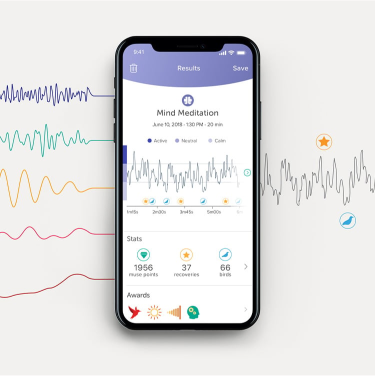
Without biofeedback from the Muse headband, both beginning and experienced meditators can be left wondering:
- Is my meditation practice effective?
- Is my meditation practice improving?
- Has my meditation practice hit a plateau?
- Should I increase my meditation time?
Data from the Muse app can help answer these questions and ensure your meditation practice is always on the right track.
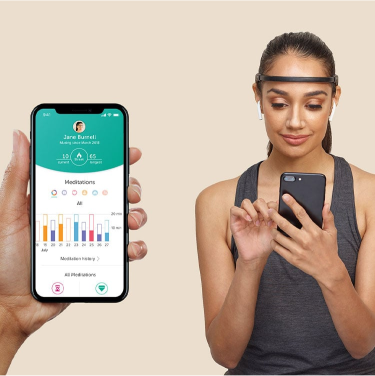
How Muse Measures Your Brain Activity During Meditation
Did you know that Muse has the ability to track the full spectrum of brainwaves, including:
Gamma: These brainwaves are associated with heightened perception, learning, problem-solving, and cognitive processing.
Beta: These waves are associated with alert consciousness, thinking and excitement.
Alpha: You experience alpha waves when you are physically and mentally relaxed.
Theta: Theta waves are associated with creativity, insights, dreams, and deep meditation.
Delta: These brainwaves are associated with deep sleep, repair, and loss of bodily awareness.
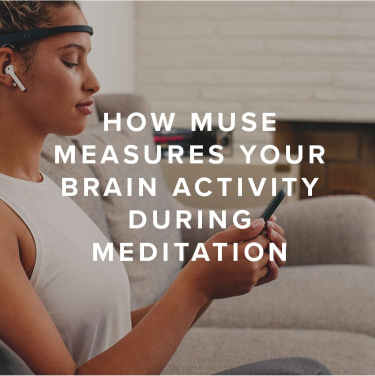
In order to better understand how Muse works, it can be helpful to know the definitions of the below terms:
Biofeedback is the process of collecting feedback from sensors that are placed on your body. These sensors can help you learn how to control how your body functions. Biofeedback is a general term that can refer to feedback from your brainwaves, breath, heart rate, muscles, and body temperature.
Neurofeedback is a form of biofeedback that is specific to brainwaves and electroencephalogram or EEG readings.
Real-time feedback: Individuals receive biofeedback from sensors in real-time as opposed to after the exercise or session.

Muse is a state of the art EEG system that uses seven sensors—two on your forehead, two behind your ears, and three for additional reference—to track your brainwaves, heartbeat, breath and body movements during guided meditation sessions.
Compared to traditional neurofeedback devices, Muse utilizes a more complex algorithm that takes into account each type of brainwave to determine whether your brain activity is active, neutral, or calm.
Traditional neurofeedback devices only focus on monitoring and training individual frequencies. Feedback from guided meditation sessions is delivered to the Muse app after the meditation is complete.
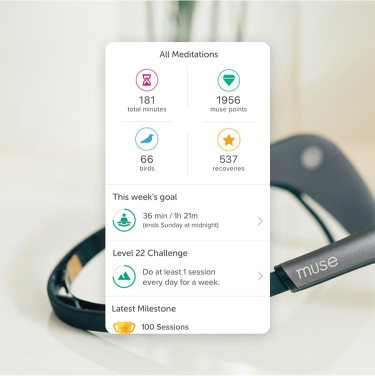
The sensors on Muse can also track your breath, heart rate, body movements and brainwaves in real-time while you are completing one of our unguided soundscape meditations. When the mind is active, the volume of the soundscape increases. For example, if you're using the beach soundscape, the sound of waves will get louder as you lose focus. When the mind calms, the waves sound will soften.
If your mind wanders during a session, the increase in volume can help remind you to refocus your thoughts. This feedback loop helps accelerate learning and may improve the effectiveness of your meditation sessions over time.

Is Muse Meditation More Effective Than Guided Meditation
While any type of meditation is more effective than not meditating at all, you may be wondering how your practice may be improved with the use of Muse, the brain sensing headband.
A study conducted by Professor Michela Balconi at the Catholic University of Milan followed 40 participants over four weeks to determine if participants who meditated with Muse would show measurable differences as compared to participants who completed breathing exercises while listening to nature sounds.
After four weeks of meditating with Muse, meditators showed an improvement in response times while completing cognitive tasks as well as positive changes in their resting brain states, which suggest an increased ability to relax.
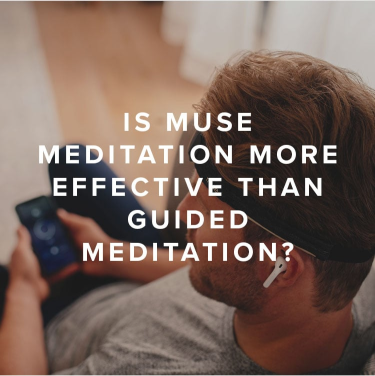
Muse users also displayed positive changes in their brain plasticity and a significantly larger—more than 15 percent—reduction in stress over the control group.
These findings show that regular use of Muse in well-controlled studies can lead to brain changes that suggest measurable improvements in overall brain health.
For more information, you can read Professor Balconi’s full studies here.

Beginning meditators may be wondering what to expect during their first guided meditation. Guided meditations may include:
- A brief introduction to your teacher
- A moment to get settled into your meditation seat
- Instructions on how to sit or lie down during the meditation
- An introduction to the meditation technique being used in the session
- Prompts for moments of reflection on the meditation theme
- Instructions on how to integrate the meditation technique into your daily life
- Moments of silence to help you achieve deeper relaxation and focus
This 13-minute guided meditation by Kate Johnson will help you stay grounded and find love during especially difficult times: SOS Calm. Listen to it anytime you’re experiencing a crisis or just need a relaxing break from your day-to-day stress.

WHEN’S THE BEST TIME TO MEDITATE?
When is the Best Time to Meditate?
If you’re just starting your meditation practice or hoping to develop a more consistent practice, it can be helpful to set aside time for meditation in your daily schedule.
While there is no right time to meditate during the day, you may get different benefits depending on what time you complete your meditation session: Morning: Meditate in the morning to clear your mind, practice gratitude and mentally prep for the day ahead. If you’d like to try a morning gratitude meditation, listen to this Untangle episode with Muse’s Head of Content, Patricia Karpas. Afternoon: Meditate in the afternoon to step away from your day-to-day tasks and experience renewed energy and focus for the rest of your day. After work: Leave work stress behind and seamlessly transition into your evening routine.Before bed: Relax and prepare your mind and body for a night of restful sleep. Wake up in the morning feeling refreshed and ready to tackle the day. Did you know that Muse has a device specifically designed to help you get a better night’s rest? Get a deeply restorative sleep with the Muse S and Go-To-Sleep Journeys. Meditating before bed will help you learn how to turn off your busy mind and let the world melt away—day or night.Here are a few tips to help you develop a consistent meditation practice: Choose a meditation time that works best for your schedule and try to stick to it as best as you can. If you tend to wake up early but are busy during the day, a morning meditation session might be best for you. If you have a packed schedule during the day but have time to relax at night, evening sessions might be more appropriate.If you plan to meditate during the day, be sure to add a meditation event to your calendar to let coworkers know that you will be busy during that time.Communicate your plans to meditate to your family and friends. Ask them to help hold you accountable and check in on your progress as well as give you some quiet time and space to meditate when scheduled.Add a meditation reminder to your phone or smart speaker. If you get busy during the day, an alarm can help you remember to complete your session.Choose a meditation space that is calm, quiet, and relaxing. Having this space in mind before you start your session can help you easily transition into your practice.If you get too busy and miss a meditation session, try to schedule one for later in the day, if possible.If you’re not in the mood to meditate or feeling sick, give yourself permission to take the day off from your practice. Pick it up again as soon as possible.Incorporate an in-person meditation class into your schedule. Scheduling in-person classes can help hold you accountable and introduce you to a local meditation community.Be gentle, curious, and compassionate with yourself! Starting any new habit is hard, so remember to celebrate the little wins and take it slow. The sooner you can make meditation a healthy habit, the sooner you can start to experience all of the amazing benefits it has to offer. If you have trouble establishing a consistent practice, don’t be discouraged, just start again as soon as possible in order to regain momentum.
LEARN MORE ABOUT MEDITATION
Learn More about Meditation
If you’d like to learn more about meditation, explore some of these additional articles on the Muse blog:
- What is the difference between meditation and mindfulness?
- What is the most effective time of the day to meditate?
- Common Meditation Myths and Misconceptions
- Ask Inna Miretski: 3 Meditation Techniques for Beginners
- Too Busy To Meditate? Here’s Why You Need It The Most
- Ask Scott Ste Marie: How To Deepen Your Meditation Practice
- Ask Krista Schilter: 5 Questions With A Meditation Teacher To Improve Your Practice
- Learning To Stress Less: A Study For Novice Meditators
- 10 Best Meditation Books (From Beginner to Expert)
- How Meditation Increases Emotional Intelligence & Leadership Potential
- Priming Innovation: Meditation to Achieve Creativity
- Stress VS Burnout – How Stress Inhibits Performance and How Meditation Can Help
References
- A low‐dose mindfulness intervention and recovery from work: Effects on psychological detachment, sleep quality, and sleep duration; https://onlinelibrary.wiley.com/doi/abs/10.1111/joop.12115
- Hwang WJ, Lee TY, Lim KO, et al. The effects of four days of intensive mindfulness meditation training (Templestay program) on resilience to stress: a randomized controlled trial. Psychol Health Med. 2018;23(5):497–504. doi:10.1080/13548506.2017.136340
- Fredrickson, Barbara L et al. “Open hearts build lives: positive emotions, induced through loving-kindness meditation, build consequential personal resources.” Journal of personality and social psychology vol. 95,5 (2008): 1045-1062. doi:10.1037/a001326
- A new sleep study may open your eyes to meditation: https://news.usc.edu/75923/a-sleep-study-may-open-your-eyes-to-meditation/
- Study: Meditation Improves Memory, Attention https://www.theatlantic.com/health/archive/2013/05/study-meditation-improves-memory-attention/275564/
- Norris, C. J., Creem, D., Hendler, R., & Kober, H. (2018). Brief Mindfulness Meditation Improves Attention in Novices: Evidence From ERPs and Moderation by Neuroticism. Frontiers in human neuroscience, 12, 315. https://doi.org/10.3389/fnhum.2018.00315
- Promoting Psychological Well-Being Through an Evidence-Based Mindfulness Training Program Front. Hum. Neurosci., 10 July 2019 | https://doi.org/10.3389/fnhum.2019.00237
- 8-week Mindfulness Based Stress Reduction induces brain changes similar to traditional long-term meditation practice – A systematic review http://www.teradanismanlik.com/resim/upload/141f.pdf
- A comparison of mindfulness-based stress reduction and an active control in modulation of neurogenic inflammation https://www.sciencedirect.com/science/article/abs/pii/S0889159112004758
- Testing a mobile mindful eating intervention targeting craving-related eating: feasibility and proof of concept https://link.springer.com/article/10.1007/s10865-017-9884-5
- Promoting Altruism Through Meditation: An 8-Week Randomized Controlled Pilot Study https://self-compassion.org/wp-content/uploads/publications/altruism.pdf
- Combating Implicit Bias With Meditation https://repository.upenn.edu/cgi/viewcontent.cgi?article=1149&context=wharton_research_scholars
Select your store
Please select your country below so we can display the correct prices, delivery times, and delivery costs for your location.
